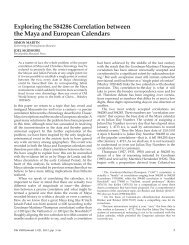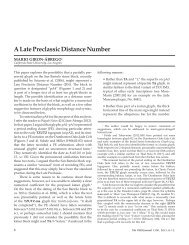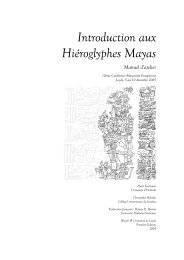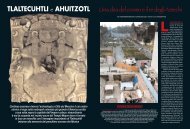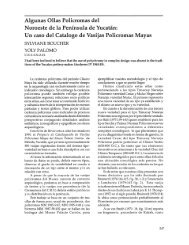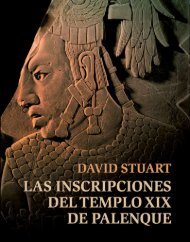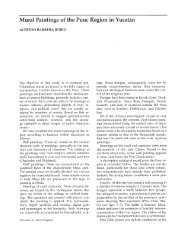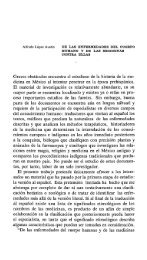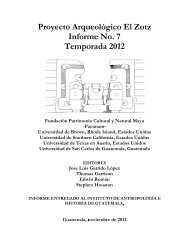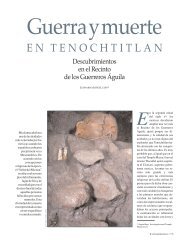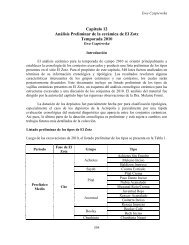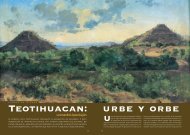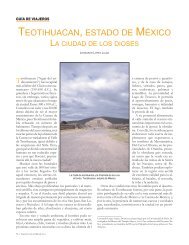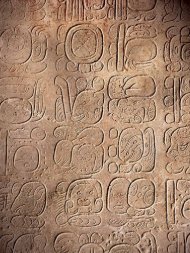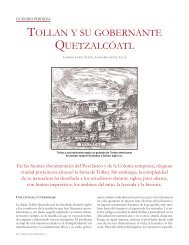Popol Vuh: Sacred Book of the Quiché Maya - Mesoweb
Popol Vuh: Sacred Book of the Quiché Maya - Mesoweb
Popol Vuh: Sacred Book of the Quiché Maya - Mesoweb
You also want an ePaper? Increase the reach of your titles
YUMPU automatically turns print PDFs into web optimized ePapers that Google loves.
have been a compilation <strong>of</strong> oral traditions based to one degree or ano<strong>the</strong>r on mythic and<br />
historical details outlined in a Precolumbian codex with <strong>the</strong>ir associated painted illustrations.<br />
Authors <strong>of</strong> <strong>the</strong> <strong>Popol</strong> <strong>Vuh</strong>:<br />
The authors <strong>of</strong> <strong>the</strong> <strong>Popol</strong> <strong>Vuh</strong> were anonymous. In <strong>the</strong> text <strong>the</strong>y refer to <strong>the</strong>mselves only as<br />
“we” (p. 64), indicating that <strong>the</strong>re were more than one who contributed to its compilation.<br />
The anonymity <strong>of</strong> <strong>the</strong> authors is unusual since most Colonial period highland <strong>Maya</strong><br />
documents were prepared for some <strong>of</strong>ficial purpose, and were duly signed by <strong>the</strong>ir authors as<br />
testimony <strong>of</strong> <strong>the</strong>ir veracity. For whatever reason, those who were responsible for compiling<br />
<strong>the</strong> <strong>Popol</strong> <strong>Vuh</strong> did not wish <strong>the</strong>ir identities to be known.<br />
The authors were traditionalists, in <strong>the</strong> sense that <strong>the</strong>y recorded <strong>the</strong> history and <strong>the</strong>ology<br />
<strong>of</strong> <strong>the</strong> ancient highland <strong>Maya</strong> people without adding material from European sources. The<br />
<strong>Popol</strong> <strong>Vuh</strong> thus contains very little direct Christian influence. By its own account it is a<br />
faithful record <strong>of</strong> <strong>the</strong> contents <strong>of</strong> <strong>the</strong> ancient <strong>Popol</strong> <strong>Vuh</strong> text which could no longer be seen (p.<br />
64). Although <strong>the</strong> traditions <strong>of</strong> <strong>the</strong> book were compiled after <strong>the</strong> Conquest, “under <strong>the</strong> law <strong>of</strong><br />
God and Christianity” (ibid.), its <strong>Quiché</strong> authors venerated <strong>the</strong>ir traditional <strong>Maya</strong> gods as<br />
luminous, wise beings who brought life and light to <strong>the</strong> world through <strong>the</strong>ir creative works.<br />
The statement that <strong>the</strong> <strong>Popol</strong> <strong>Vuh</strong> was composed within Christianity immediately follows a<br />
declaration that <strong>the</strong> <strong>Maya</strong> gods “accomplished <strong>the</strong>ir purpose in purity <strong>of</strong> being and in truth”<br />
long before <strong>the</strong> arrival <strong>of</strong> <strong>the</strong> Christian God (p. 63). Thus <strong>the</strong> <strong>Popol</strong> <strong>Vuh</strong> contrasts its “ancient<br />
word” (pp. 59, 64) which contains light and life, with that <strong>of</strong> <strong>the</strong> more recent voice <strong>of</strong><br />
Christianity. In highland <strong>Maya</strong> society, antiquity denotes authority. A modern priest-shaman<br />
in Momostenango once told me that <strong>the</strong> <strong>Maya</strong> “Earth God” is greater than Christ and <strong>the</strong><br />
saints because he was worshiped by his people for centuries before <strong>the</strong> arrival <strong>of</strong> <strong>the</strong><br />
Europeans.<br />
Such unapologetic reverence for <strong>the</strong> ancient gods would have been <strong>of</strong>fensive to <strong>the</strong> Spanish<br />
26



